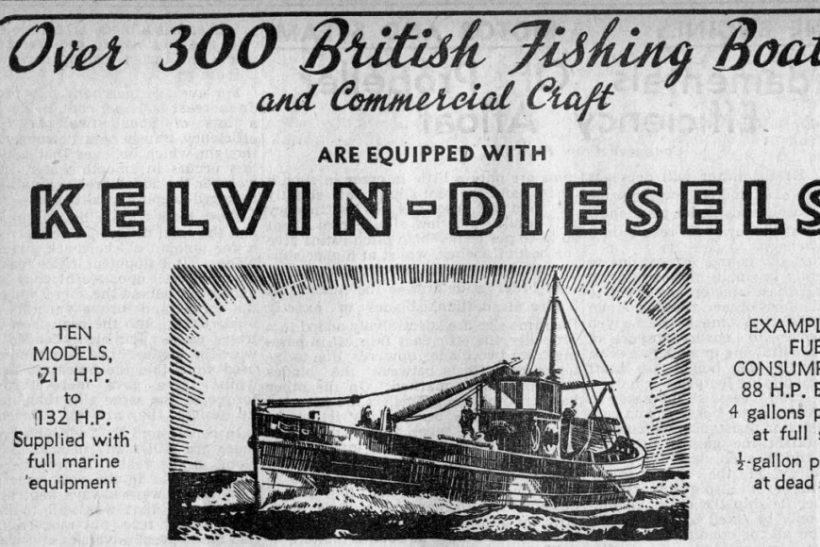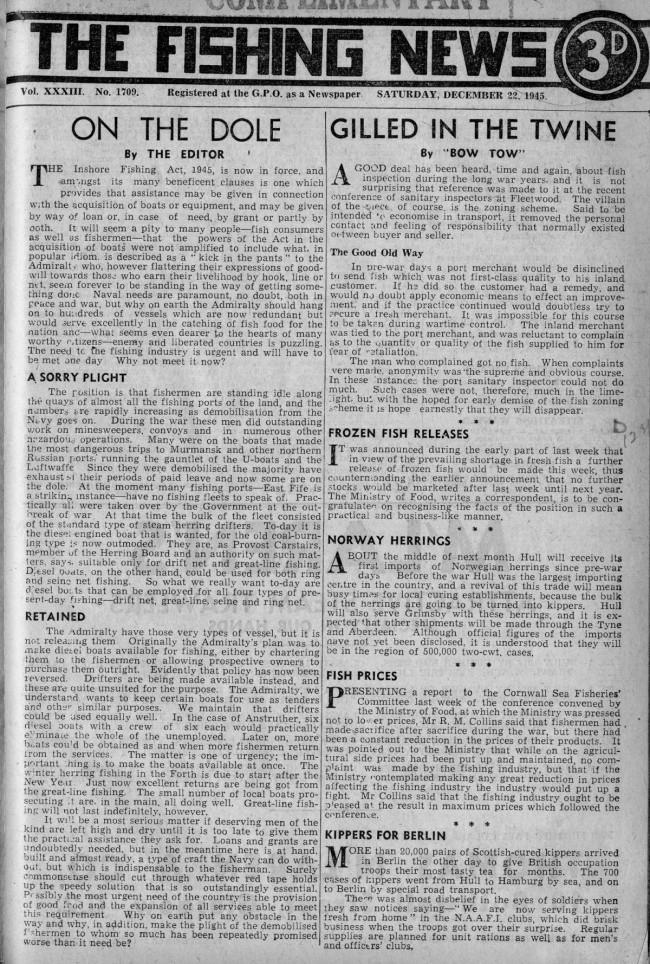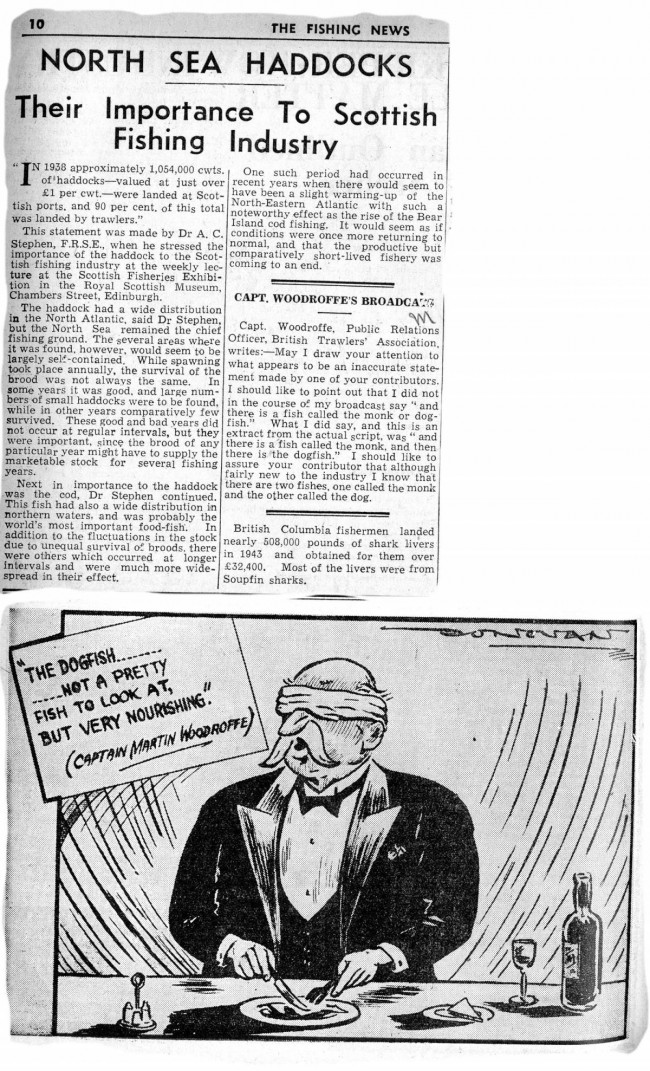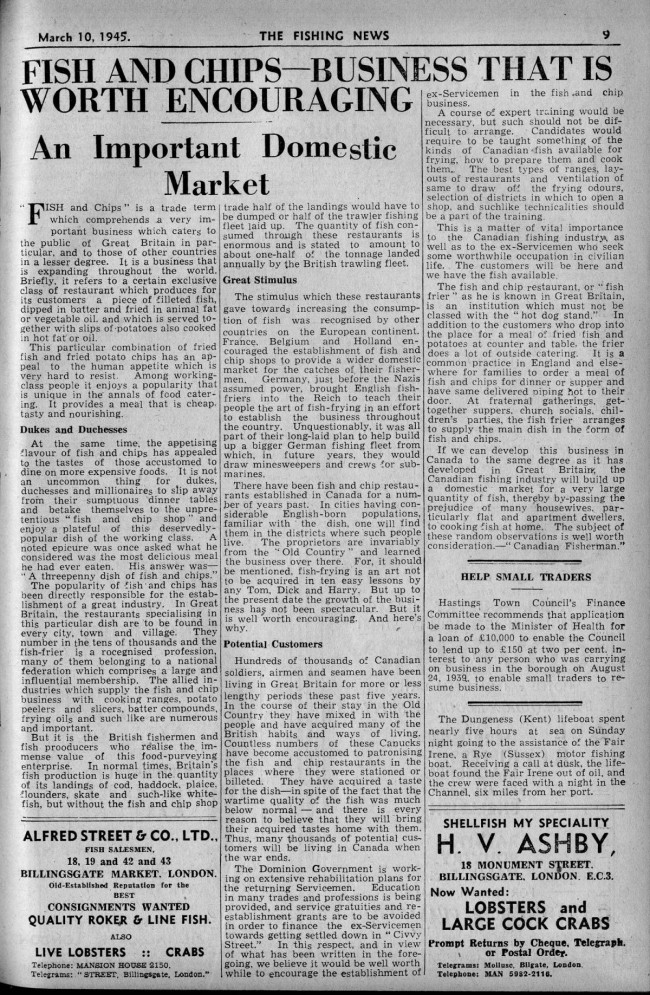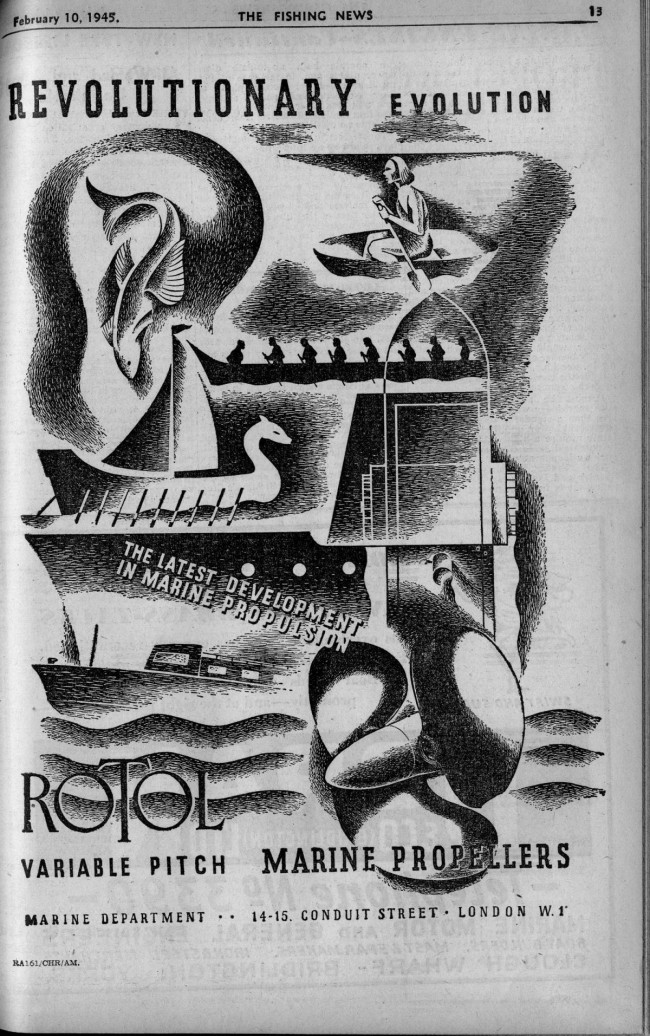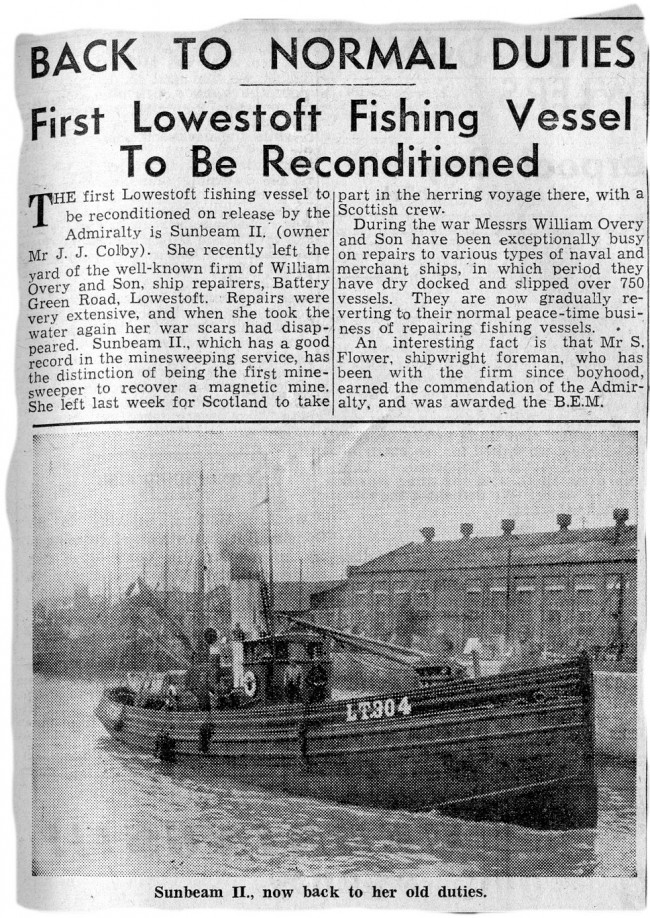This week Fishing News looks back to 1945, a year that saw the country struggling to recover as the Second World War came to an end. In a stark reflection of the economic and political climate, Fishing News is also at one of its lowest and thinnest points, with half the number of pages, as was the case before the war. Maximum fish prices are being imposed by the government, with fines for non-compliance. Whitefish landings in Scotland (29%) are lower than they were in 1938. England, which in 1938 delivered considerably more than double the landings of whitefish than Scotland, saw landings in 1945 some 59% lower.
■ This is one of those momentous years, but for all the wrong reasons. It started with the Red Army liberating Auschwitz, but arriving too late to save Anne Frank, who died from typhus in Belsen.
■ Canadian soldiers liberate Amsterdam and Lord Haw Haw is captured and hanged a year later. Nazi Joseph Goebbels and his wife kill their six children before committing suicide and George Orwell publishes his book Animal Farm, a critique of Stalin’s USSR. The USA bomber Enola Gay drops the code-named ‘Little Boy’ atomic bomb on Hiroshima at 8.15am in the morning and the BBC Light Programme radio station is launched, aimed at what it calls mainstream light entertainment.
■ Gandhi calls for British troops to leave India and SS chief Himmler takes his own life while in British custody. Gimbels department store in New York City sells the first ballpoint pen for $12, and a whole slew of musicians come into the world – Rod Stewart, Bob Marley, Pete Townsend, Debbie Harry, Bryan Ferry, Eric Clapton, Neil Young, Davy Jones of the Monkees and Van Morrison.
■ While the French give their women the vote for the first time, and victory for the allies arrives on May 7, the British vote in what turns out to be one of the greatest and most significant governments in their country’s history. Grateful to Churchill, but determined to build a more egalitarian society, like they’d experienced during the war, Clement Attlee becomes Labour Prime Minister and the mighty and much-needed National Health Service is born.
■ Although 1945 marked the end of hostilities, Britain faced a long period of austerity, and gradual but slow consolidation was in order before the country returned to some resemblance of normality. With thousands of fishermen having joined the Royal Navy Patrol Service at the outset of WWII, the similarly-beleaguered fishing industry also faced a long road back towards normality.
■ The Central Depot of the Royal Naval Patrol Service, HMS Europa, usually known as Sparrow’s Nest, was located at Lowestoft, the most easterly point of Great Britain, and then the closest British military establishment to the enemy until decommissioned in 1946.
■ Sparrow’s Nest eventually became the administrative headquarters for more than 70,000 men and 6,000 boats, including trawlers, whalers, drifters, MFVs, MLs (motor launches), and, later, MMS (Motor Minesweepers or ‘Mickey Mouses’).
■ Of this total, from September 1939 through to May 1945, approximately 260 trawlers were lost in action… This material loss however pales into insignificance when compared to the 15,000 or so RNPS personnel who were killed in the Second World War, including the 2,385 RNPS seaman who ‘have no known grave but the sea’.
■ Because of the dangers and losses faced by the men of the RNPS, in 1945 they were honoured in a statement made by Prime Minister Winston Churchill:
“Now that Nazi Germany has been defeated I wish to send you all, on behalf of His Majesty’s Government, a message of thanks and gratitude.
“The work you do is hard and dangerous. You rarely get, and never seek, publicity; your only concern is to do your job, and you have done it nobly. You have sailed in many seas and all weathers… This work could not be done without loss, and we mourn all who have died and over 250 ships lost on duty.
“No work has been more vital than yours; no work has been better done. The Ports were kept open and Britain breathed. The Nation is once again proud of you.”
Have you enjoyed this blast from commercial fishing’s past? Each week we look back at our wealth of history in Fishing News, so stay tuned for the next instalment of nostalgia…


This week Fishing News looks back to 1945, a year that saw the country struggling to recover as the Second World War came to an end. In a stark reflection of the economic and political climate, Fishing News is also at one of its lowest and thinnest points, with half the number of pages, as was the case before the war. Maximum fish prices are being imposed by the government, with fines for non-compliance. Whitefish landings in Scotland (29%) are lower than they were in 1938. England, which in 1938 delivered considerably more than double the landings of whitefish than Scotland, saw landings in 1945 some 59% lower.
■ This is one of those momentous years, but for all the wrong reasons. It started with the Red Army liberating Auschwitz, but arriving too late to save Anne Frank, who died from typhus in Belsen.
■ Canadian soldiers liberate Amsterdam and Lord Haw Haw is captured and hanged a year later. Nazi Joseph Goebbels and his wife kill their six children before committing suicide and George Orwell publishes his book Animal Farm, a critique of Stalin’s USSR. The USA bomber Enola Gay drops the code-named ‘Little Boy’ atomic bomb on Hiroshima at 8.15am in the morning and the BBC Light Programme radio station is launched, aimed at what it calls mainstream light entertainment.
■ Gandhi calls for British troops to leave India and SS chief Himmler takes his own life while in British custody. Gimbels department store in New York City sells the first ballpoint pen for $12, and a whole slew of musicians come into the world – Rod Stewart, Bob Marley, Pete Townsend, Debbie Harry, Bryan Ferry, Eric Clapton, Neil Young, Davy Jones of the Monkees and Van Morrison.
■ While the French give their women the vote for the first time, and victory for the allies arrives on May 7, the British vote in what turns out to be one of the greatest and most significant governments in their country’s history. Grateful to Churchill, but determined to build a more egalitarian society, like they’d experienced during the war, Clement Attlee becomes Labour Prime Minister and the mighty and much-needed National Health Service is born.
■ Although 1945 marked the end of hostilities, Britain faced a long period of austerity, and gradual but slow consolidation was in order before the country returned to some resemblance of normality. With thousands of fishermen having joined the Royal Navy Patrol Service at the outset of WWII, the similarly-beleaguered fishing industry also faced a long road back towards normality.
■ The Central Depot of the Royal Naval Patrol Service, HMS Europa, usually known as Sparrow’s Nest, was located at Lowestoft, the most easterly point of Great Britain, and then the closest British military establishment to the enemy until decommissioned in 1946.
■ Sparrow’s Nest eventually became the administrative headquarters for more than 70,000 men and 6,000 boats, including trawlers, whalers, drifters, MFVs, MLs (motor launches), and, later, MMS (Motor Minesweepers or ‘Mickey Mouses’).
■ Of this total, from September 1939 through to May 1945, approximately 260 trawlers were lost in action… This material loss however pales into insignificance when compared to the 15,000 or so RNPS personnel who were killed in the Second World War, including the 2,385 RNPS seaman who ‘have no known grave but the sea’.
■ Because of the dangers and losses faced by the men of the RNPS, in 1945 they were honoured in a statement made by Prime Minister Winston Churchill:
“Now that Nazi Germany has been defeated I wish to send you all, on behalf of His Majesty’s Government, a message of thanks and gratitude.
“The work you do is hard and dangerous. You rarely get, and never seek, publicity; your only concern is to do your job, and you have done it nobly. You have sailed in many seas and all weathers… This work could not be done without loss, and we mourn all who have died and over 250 ships lost on duty.
“No work has been more vital than yours; no work has been better done. The Ports were kept open and Britain breathed. The Nation is once again proud of you.”
Have you enjoyed this blast from commercial fishing’s past? Each week we look back at our wealth of history in Fishing News, so stay tuned for the next instalment of nostalgia…

